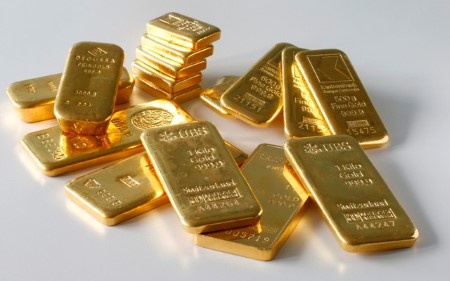




Policy Rate Updates: BSP outlook — cloudy with a chance of rate cut
 DOWNLOAD
DOWNLOAD

January Economic Update: Growth slows, prices rise
 DOWNLOAD
DOWNLOAD

Inflation Update: Up, up, and away?
 DOWNLOAD
DOWNLOAD


Gold slides after Powell doubles down on tight monetary policy

Aug 26 (Reuters) – Gold fell over 1% on Friday after Federal Reserve Chair Jerome Powell in his speech at Jackson Hole said the US economy needed a tight monetary policy until inflation was under control.
Powell said this could mean slower growth, but did not hint at what the Fed might do at its September policy meeting.
Spot gold fell 1.2% to USD 1,738.14 per ounce by 1335 p.m. ET, en route to fall for a second straight week, down about 0.4% so far. US gold futures settled 1.2% lower at USD 1,749.8.
“Equities and metals are suffering from Powell’s unvarnished reminder that rates will need to be high for longer and that perhaps 75 bps is the default for September unless the totality of the data suggests otherwise,” said Tai Wong, a senior trader at Heraeus Precious Metals in New York.
Gold is considered a hedge against economic risks, but rising interest rates dent the appeal of the non-yielding asset.
Since there was no dovish pivot from Powell, gold will continue to face pressure as it will have to deal with higher interest rates, said Philip Streible, chief market strategist at Blue Line Futures in Chicago.
US two-year Treasury yields briefly popped to their highest since October 2007 before stabilizing near two-month highs, while the dollar rebounded from an initial dip.
Standard Chartered analyst Suki Cooper said in a note that while gold could trend lower in the coming months, most of the downside risk was already priced in.
Bullion could also benefit from “tailwinds including recession risk, a price-responsive physical market, already scaled-back positioning and elevated inflation,” Cooper added.
Physical gold premiums in China jumped this week to their highest since last October, while demand cooled in India.
Spot silver dropped 2.02 % to USD 18.89 per ounce.
Platinum fell 2.04% to USD 863.00, and palladium fell 1.3% to USD 2,119.23.
(Reporting by Ashitha Shivaprasad, additional reporting by Arpan Varghese and Rahul Paswan in Bengaluru; editing by Jonathan Oatis, Shailesh Kuber and Vinay Dwivedi)
This article originally appeared on reuters.com





 By Reuters
By Reuters